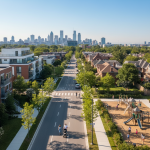In the complex landscape of UK property ownership, one key distinction prevails: leasehold versus freehold. As potential property buyers, understanding these terms is crucial. They not only influence the legal aspects of your ownership but also affect the financial and practical dynamics of managing the property. Whether you are eyeing a charming countryside cottage or a sleek city apartment, the type of ownership can dramatically shape your experience. This article endeavors to clarify these concepts, equipping you with the knowledge required to make informed decisions.
Understanding Freehold Properties
In the UK, freehold property signifies the ownership of the building and the land it stands on. As a freeholder, you possess perpetual rights to the property, unrestricted by time. This means you have the freedom to modify, renovate, or sell without seeking approval from a landlord or a leaseholder.
A lire également : How can you identify emerging property market hotspots in the UK?
Though often more expensive to buy, freehold properties provide numerous benefits. They typically incur fewer ongoing costs since you are not required to pay ground rent or service charges often associated with leasehold arrangements. With autonomy over maintenance and servicing, you can tailor the upkeep to your standards.
It’s essential, however, to note that freehold properties can demand more responsibility. You must keep up with repairs and improvements, which can be costly over time. Additionally, while the control is liberating, the absence of a landlord or managing agent means navigating legal or structural issues alone.
En parallèle : How can you effectively negotiate the price of a property in the current market?
Overall, freehold ownership is often favored by those seeking independence and long-term investment stability. For years, it’s been a popular choice among buyers who value control over their properties and are prepared for the associated responsibilities.
Navigating Leasehold Properties
Unlike their freehold counterparts, leasehold properties involve a lease agreement between the leaseholder and the freeholder or landlord. Essentially, you own the property but not the land upon which it is built. The lease usually spans several years, ranging from 99 to 999.
With leasehold properties, you’ll pay ground rent and possibly service costs for communal areas or necessary building maintenance. These charges can vary, affecting your annual expenses significantly. It’s crucial to scrutinize lease details before purchasing, as some contain clauses that could escalate these costs over time.
Despite these charges, leasehold properties might be a more affordable entry point into the property market, especially in urban settings where freeholds are scarce. Moreover, many leaseholders appreciate the lack of direct responsibility for maintaining shared spaces, which is often managed by the freeholder or a third-party company.
As the lease term diminishes, challenges arise. Properties with leases under 80 years can be harder to sell or buy due to the complexities of lease extensions or potential purchase of the freehold. However, legislation exists to protect leaseholders, allowing them to extend their leases or perhaps join with others to collectively buy the freehold, converting their status.
For those who prefer a more communal approach to property ownership and are open to potential costs in exchange for reduced direct responsibility, leasehold can be a suitable option.
Pros and Cons of Each Ownership Type
Deciding between leasehold and freehold properties involves weighing distinct advantages and disadvantages.
With freehold, you acquire full control over your property and don’t have to pay ground rent or service charges. This can lead to substantial cost savings over time. On the downside, the initial purchase price is usually higher, and the responsibility for repairs and maintenance falls entirely on your shoulders.
For leaseholders, the benefits include a potentially lower initial buying cost and fewer day-to-day maintenance concerns. However, ground rent and service costs can increase, and the lease itself may devalue as it shortens, complicating future sales or mortgage agreements.
Consider these factors carefully in the context of your financial situation, long-term plans, and lifestyle preferences. A leasehold might be perfect for those who prefer less upfront financial burden and are comfortable with communal living dynamics, while a freehold offers freedom and potentially fewer ongoing costs but at a higher initial purchase cost and greater maintenance responsibility.
Legal Considerations and Future Trends
Navigating the legal landscape of property ownership is crucial, especially in the UK where lease terms and freehold rights can be complex. Understanding your rights, as well as any obligations under landlord-tenant law, is vital for both leaseholders and freeholders.
Leaseholders should be aware of their right to extend their lease or collectively buy the freehold if certain criteria are met. This can add significant value to a leasehold property and transform it into a freehold, preventing depreciation from a dwindling lease term.
In recent years, legislative changes have aimed at making leasehold property ownership fairer. Government interventions are working to eliminate unreasonably high ground rents and are providing more rights to buy and extend leases. Staying informed about these changes is crucial for buyers and existing leaseholders.
Emerging trends also indicate a shift towards simplified property ownership structures. Increasingly, buyers are opting for freehold, or lease agreements with fixed terms and transparent costs. The drive towards transparency and fair dealings in the property market means the traditional leasehold model could evolve, offering fairer terms and fewer financial surprises.
Ultimately, whatever type of property you choose to buy, understanding the legal and financial implications is paramount. A well-informed decision will ensure your ownership experience is not only satisfactory but rewarding.
The distinction between leasehold and freehold properties in the UK is more than a mere technicality; it shapes the essence of your property ownership experience. While freeholds offer total control and fewer ongoing costs, they come with heightened responsibility. Leaseholds, on the other hand, provide a potentially lower entry point but with associated fees and the imperative to manage diminishing lease terms.
As prospective buyers, it’s crucial to align your choice with your financial capabilities and personal preferences. The ever-changing legal landscape offers new opportunities and challenges, underscoring the importance of staying informed. Whether you opt for leasehold or freehold, the key is making a choice that complements your lifestyle and future ownership aspirations.
In the end, understanding these ownership types and their implications will ensure you make a decision that stands the test of time and enhances your overall property experience in the UK.











